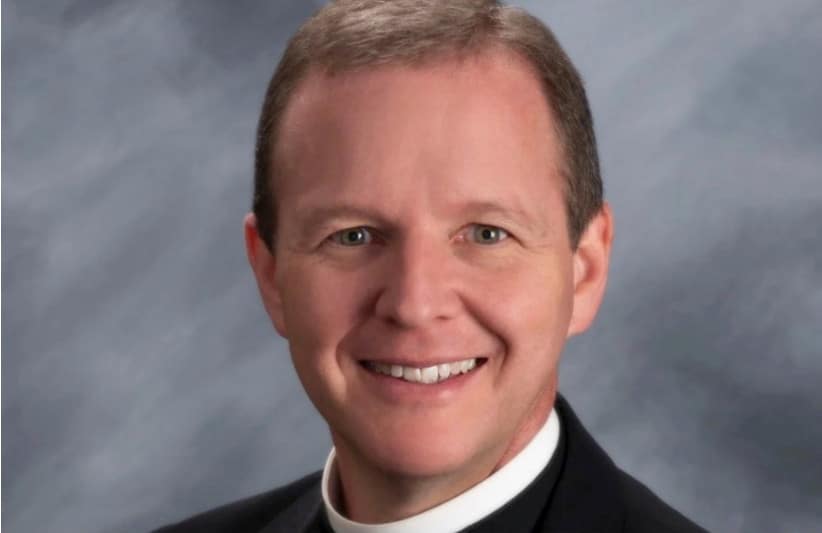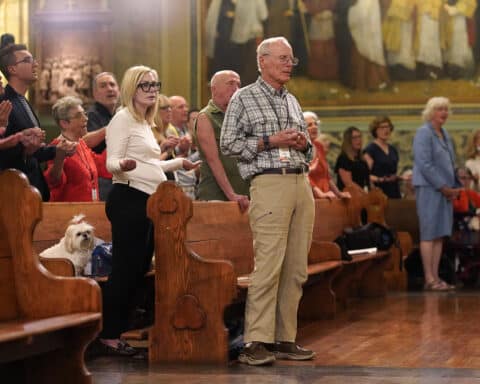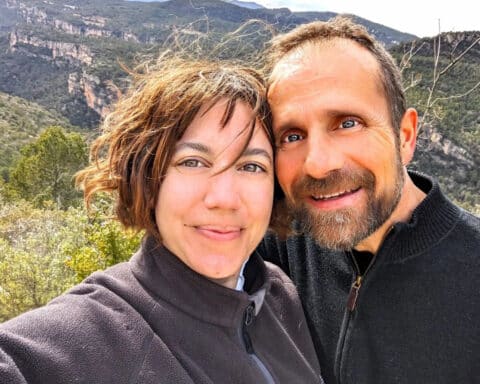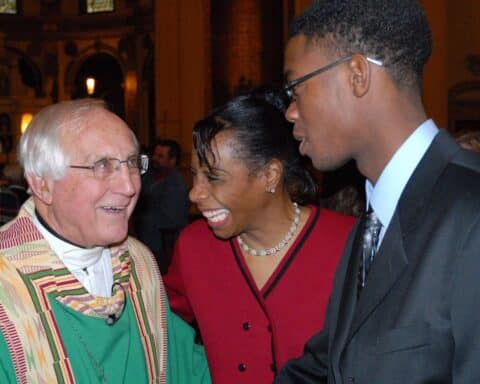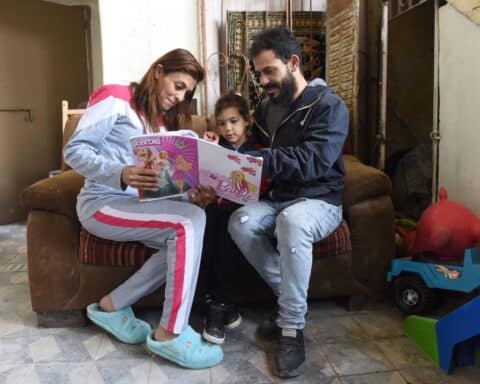When Bishop-elect Erik T. Pohlmeier was introduced as the next ordinary of the Diocese of St. Augustine, Florida, on May 24, his predecessor, Bishop Felipe Esteves, noted that Bishop-elect Pohlmeier has said Catholicism is a family business. Bishop-elect Pohlmeier’s mother, Sharon, is the secretary of St. Joseph Parish in Paris, Arkansas, where he grew up, and his father, Tom, is a permanent deacon and the maintenance man, and he doesn’t have any memory of not being involved in the Church. Several of his siblings also work in the Church, including in Catholic media and Catholic schools, and his oldest niece, Rebecca Pohlmeier, authored a picture book published by Our Sunday Visitor, “Glory Be Saints A to Z” (2020). His brother, Jason, is a Catholic school principal and was ordained as a permanent deacon for the Diocese of Little Rock, Arkansas, in June.
Bishop-elect Pohlmeier’s family definitely nurtured his vocation to the priesthood, he said, adding that families have a role to play in encouraging young people to listen for a call to priesthood or religious life. Bishop-elect Pohlmeier was ordained a priest of the Diocese of Little Rock in 1998. He will turn 51 on July 20; two days later, he is to be ordained a bishop and installed as bishop of St. Augustine.
Our Sunday Visitor: How was your family involved in the Church?
Bishop-elect Erik T. Pohlmeier: My parents, Tom and Sharon, were involved in everything: Cursillo, Marriage Encounter, mom directed the church choir. The priority of the Faith was obvious, and it has carried through, not just with me. I have a sister and three brothers, 20 nieces and nephews with the oldest one being 20, and we’re seeing it into the next generation.
Our Sunday Visitor: What’s your earliest memory of church?
Bishop-elect Pohlmeier: It starts with my parents and my grandmother. When I was 3, my grandpa died, and we moved in with my grandmother — my mom’s mom. My entire life, she was right there.
I’m the oldest of the five of us. When we were little, we would be in the bed with Grandma, then in a separate bed in the same room with Grandma, then in another room, but you could still hear her. When she went to bed, she would pray the Rosary out loud, and I would fall asleep many of the nights of my life listening to her praying the Rosary out loud. Her prayers for me and directly for priesthood were a constant.
Then, also, my parents from my earliest memories were involved in everything at church. My dad was a Sunday school teacher before we were old enough for Sunday school. He just retired from doing church camp in the summer — the teenagers when I was about 10 were asking about some kind of church camp for the summer, and he agreed he would do a church camp. It was going to be a one-time event. It turned into a more than 25-year event. My parents were both involved in Cursillo and Marriage Encounter as well.
Now, as a priest, in evangelization and family life, the key to me in fostering vocations is a combination of prayer with and conversation about faith. It’s the environment at home that really shapes who we become. We, the parish, can do the catechesis, but faith has to be spoken about and be part of the family’s daily life.
In my family, we were involved in church, but we always prayed at home, and we spoke about faith easily.
Our Sunday Visitor: Did you do formal family devotions?
Bishop-elect Pohlmeier: We prayed before meals, and we prayed the Rosary as a family on a regular basis. My parish had a weekly Tuesday evening novena to Our Lady of Perpetual Help, and I would be an altar server for those novena prayers and the Benediction that went with it.
We always had the seasons of the Church year as part of our life — simple things like having an Advent wreath in addition to praying before dinner, and during Lent we had a family penance, things like not eating food between meals. It was a combination of prayers and practices.
Our Sunday Visitor: When did you start considering whether you had a vocation to the priesthood?
Bishop-elect Pohlmeier: That didn’t start until college. It is interesting that because it was so much a part of the fabric of our family life, I fell into that practice naturally. I didn’t question my faith or consider not practicing my faith. It was in college that I had to decide, yes, I am going to do things for myself. It was that nobody was telling me I had to do it, and there was a shift not in practice but in mentality. This was at the University of Arkansas in Fayetteville. I was getting involved in campus ministry there and meeting peers and other young adults who practiced their faith. There was that shift toward taking things seriously. At the same time, I began to learn about miracles and recent healings, and I began to see it as something real and present now, instead of something from a book. There was an awakening to the power of God in the present, something real and ongoing.
There was a particular key moment where I went to a Marian conference where the priest did an altar call for everyone who was considering priesthood or religious life. I had chosen to go to this, and the Faith was growing within me.
Our Sunday Visitor: How did you pursue the discernment process?
Bishop-elect Pohlmeier: Well, I was at Fayetteville for two years. Then I dropped out and worked for my dad for a year. He was in construction, so I was working with him building commercial freezers in factories. The only job I ever had outside of priesthood was doing construction with my dad.
Anyway, there was initial resistance to the idea, but it was over the course of that year that I discerned my vocation to the priesthood.
Our Sunday Visitor: How did your parents react when you told them you wanted to drop out?
Bishop-elect Pohlmeier: Part of dropping out was from the encouragement of my parents. I talked to my mom about it, and she said, “You don’t have to stay in college just to be in college.” It was a moment of realizing I felt expectations from them that I had put on myself that hadn’t really come from them at all. That was a relief to me.
When I went to them and told them I thought I had a vocation to the priesthood, they said, “We were wondering when you were going to tell us.”
Our Sunday Visitor: How do you advise other parents to foster faith in their children?
Bishop-elect Pohlmeier: The thing I tell parents whenever I speak to them is to emphasize prayer with and conversation about faith. Only parents can communicate to their children that the Faith is important. If parents don’t put it into practice at home, then the message to their children is that it’s just not that important.
There’s a shift that needs to happen. We talk about parents being the first teachers of the Faith, and we come up with ways of helping them be catechesists, but that’s not the role of parents. The role of saying, “This matters,” is the role of the parents. The way you say, “This matters,” is not doing a religion assignment together. It’s praying together and talking about faith. That’s how you get children to realize that this is who we are, not what we do on Sundays.
The first steps are prayer and conversations. In my family, we’re talking now, decades after the fact, about how it all turned out. Those are still the things that matter: When you have conversations about faith, when you ask, “What’s the place of God in this situation?”
It’s not like when things go really well, you pray and you talk about faith. When tragedies come, none of that prevents the basic building blocks of prayer and conversation. Too many families who aren’t cultivating faith picture it as this impossible thing. Because they picture it that way, it seems out of reach, and they don’t do anything. What you need is a real conversation about, “Where is God present in this moment?”
Michelle Martin writes from Illinois.

